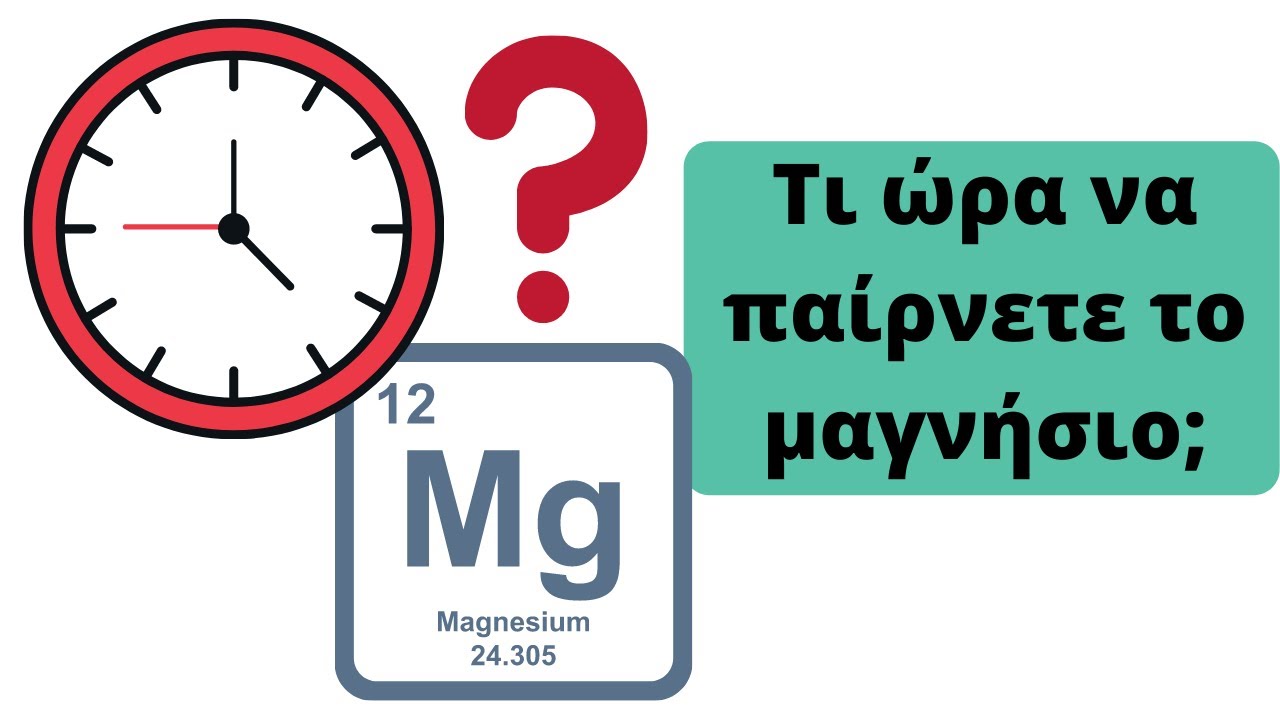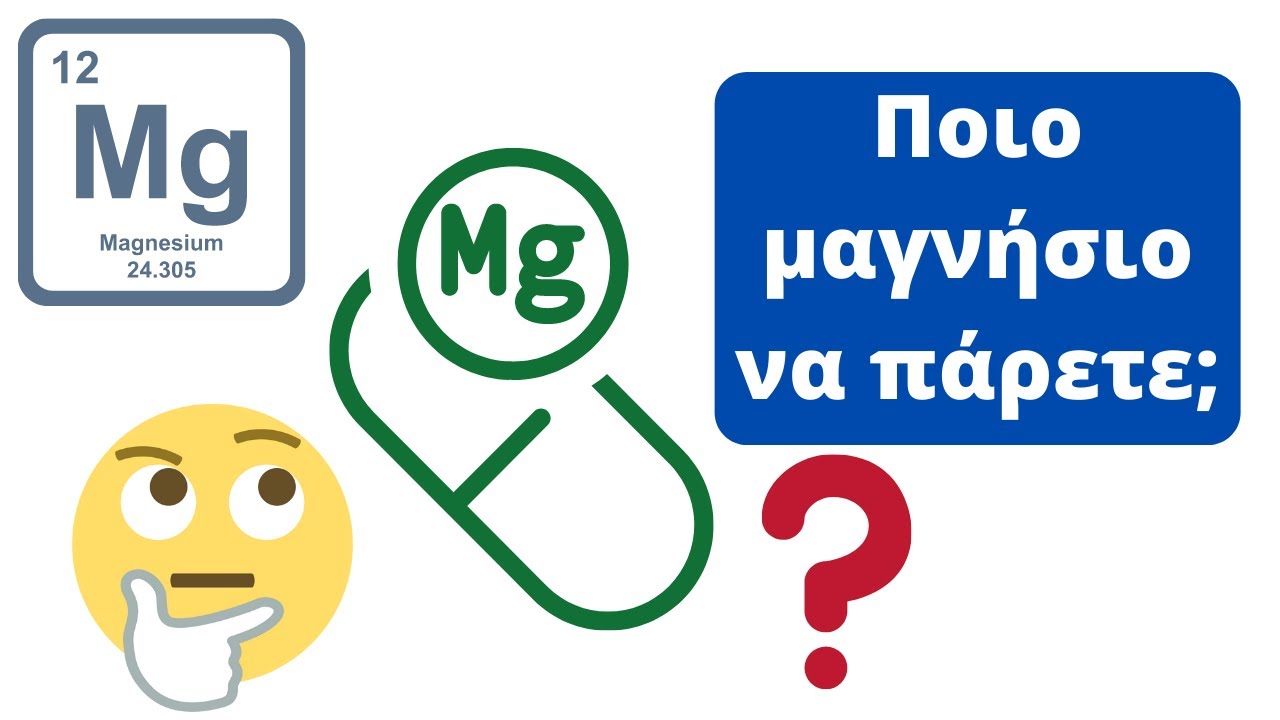Κείμενο
Το Μαγνήσιο είναι ένα από τα πιο χρήσιμα συμπληρώματα διατροφής που υπάρχουν και ανήκει σε ένα από τα λίγα συμπληρώματα διατροφής που καταναλώνω συστηματικά, όπως επίσης και ένα από αυτά που συστήνω συχνότερα. Συστήνω μαγνήσιο κυρίως για βελτίωση του ύπνου και του άγχους όπως και επίσης για μείωση της αρτηριακής πίεσης και βελτίωσης του μεταβολισμού. Το Μαγνήσιο είναι οικονομικό ασφαλές και εύχρηστο και για αυτό το συστήνω συστηματικά. είναι όμως όλες οι μορφές μαγνησίου ίδιες; μήπως υπάρχουν μορφές που ταιριάζουν περισσότερο Σε κάποιες περιπτώσεις; Σε αυτό το άρθρο θα δούμε τις μορφές μαγνησίου και σε ποιες περιπτώσεις ταιριάζουν περισσότερο. Κιτρικό μαγνήσιο. Το κιτρικό μαγνήσιο περιέχει μαγνήσιο και κιτρικό οξύ, το οξύ που υπάρχει στο λεμόνι. Το κιτρικό μαγνήσιο απορροφάται πάρα πολύ καλά και θεωρείται μία πολύ ασφαλής μορφή μαγνησίου, καθώς χρησιμοποιείται εκτεταμένα και ως συντηρητικό για πολλές τυποποιημένες τροφές, αλλά και για να δώσει όξινη γεύση σε κάποιες τροφές. Το κιτρικό μαγνήσιο απορροφάται πάρα πολύ καλά, άρα θεωρείται μία μορφή μαγνησίου με πολύ υψηλή βιοδιαθεσιμότητα, δηλαδή από αυτό που παίρνουμε σχεδόν όλο καταλήγει μέσα στο σώμα μας. Το κακό με το κιτρικό μαγνήσιο είναι ότι κάποιοι άνθρωποι που έχουν δυσπεπτικά ενοχλήματα από αυξημένα οξέα στο στομάχι μπορεί να νιώθουν καούρα αφού το πάρουν. Για αυτό, αν έχετε καούρες και γαστροοισοφαγική παλινδρόμηση, καλύτερα να αποφύγετε αυτή τη μορφή μαγνησίου γιατί μπορεί να υποφέρετε. Το κιτρικό μαγνήσιο απορροφάται πολύ γρήγορα στην κυκλοφορία, και για αυτό φαίνεται να έχει μία πολύ άμεση ηρεμιστική και υπναγωγή δράση σε αρκετά άτομα. Υπναγωγή δράση σημαίνει ότι βοηθάει στον ύπνο. Οξείδιο του μαγνησίου. Το οξείδιο του μαγνησίου είναι η πιο οικονομική μορφή μαγνησίου που θα βρείτε στην αγορά και είναι ο τύπος μαγνησίου που υπάρχει στο γάλα μαγνησίας που χρησιμοποιείται εκτεταμένα για την αντιμετώπιση της δυσκοιλιότητας. Καθώς είναι πάρα πολύ φτηνό και πάρα πολύ αποτελεσματικό για τη δυσκοιλιότητα θεωρώ

ότι είναι η καλύτερη λύση για αυτόν ακριβώς το λόγο. Δυστυχώς το οξείδιο του μαγνησίου δεν απορροφάται καλά, άρα για οποιοδήποτε άλλη πάθηση ή κατάσταση καλό είναι να κοιτάξετε μία μορφή μαγνησίου με υψηλότερη βιοδιαθεσιμότητα, δηλαδή που να απορροφάται καλύτερα. Χλωριούχο μαγνήσιο. Το χλωριούχο μαγνήσιο θα το βρείτε σε μερικές ταμπλέτες με αντιόξινα πού χρησιμοποιούνται για δυσπεπτικά ενοχλήματα. Είναι μια αρκετά οικονομική μορφή με καλή βιοδιαθεσιμότητα και θα τη βρείτε επίσης και σε αλοιφές μαγνησίου. Κάποιοι ασκούμενοι το χρησιμοποιούν σε αυτή την μορφή γιατί θεωρούν ότι τους βοηθάει πολύ σε τραυματισμούς και πόνους από την προπόνηση. Γαλακτικό μαγνήσιο. Το γαλακτικό μαγνήσιο αποτελείται από μαγνήσιο και γαλακτικό οξύ. Το γαλακτικό οξύ χρησιμοποιείται εκτεταμένα και αυτό ως πρόσθετο στις τροφές και στα ποτά, αλλά και σε συμπληρώματα διατροφής. Το γαλακτικό μαγνήσιο απορροφάται σε πάρα πολύ μεγάλο ποσοστό, αλλά σε αντίθεση με τις άλλες μορφές μαγνησίου απορροφάται σχετικά αργά, πράγμα που το κάνει χρήσιμη εναλλακτική σε άτομα που δεν ανέχονται το κιτρικό ή τις άλλες μορφές μαγνησίου. Επίσης, επειδή είναι ήπιο με το γαστρεντερικό, μπορεί να είναι μία χρήσιμη επιλογή σε άτομα που πρέπει να καταναλώσουν μεγάλες ποσότητες μαγνησίου σε συμπλήρωμα διατροφής για να διατηρήσουν φυσιολογικά επίπεδα μαγνησίου στο αίμα τους. Σε αρκετές μελέτες έχει φανεί ότι το γαλακτικό μαγνήσιο έχει τις λιγότερες παρενέργειες. Το γεγονός επίσης ότι το μαγνήσιο απελευθερώνεται στο αίμα σχετικά πιο αργά και το ότι μπορούμε να καταναλώσουμε πολύ μεγάλες ποσότητες χωρίς να επηρεαστεί το γαστρεντερικό σύστημα, το κάνει πολύ χρήσιμο σε άτομα που θέλουν να χρησιμοποιήσουν το μαγνήσιο για να αντιμετωπίσουν το στρες, χωρίς να ανησυχούν για το αν θα τους φέρει υπνηλία. Οι μορφές μαγνησίου που απορροφώνται γρήγορα, όπως το κιτρικό μαγνήσιο, είναι πιο χρήσιμες για τα άτομα που θέλουν να χρησιμοποιήσουν το μαγνήσιο για να αντιμετωπίσουν αϋπνίες, αλλά για να άτομα που θέλουν να παίρνουν μαγνήσιο το

πρωί έτσι ώστε να διατηρούν όλη μέρα πιο χαμηλό το στρες, το γαλακτικό μαγνήσιο φαίνεται να είναι μία πολύ καλή επιλογή για να δοκιμάσουν. Μαλικό μαγνήσιο. Άλλη μία μορφή μαγνησίου που θα βρείτε στην ελληνική αγορά και μπορεί να είναι χρήσιμη είναι το μαλικό μαγνήσιο. Το μαλικό μαγνήσιο έχει τα ίδια χαρακτηριστικά με το γαλακτικό μαγνήσιο, αλλά είναι λίγο πιο ακριβό. Σε περίπτωση που ψάχνετε ένα μαγνήσιο που να βοηθήσει στην αντιμετώπιση του στρες και θέλετε να το παίρνετε το πρωί χωρίς να προκαλεί υπνηλία, αλλά το γαλακτικό μαγνήσιο για οποιοδήποτε λόγο δεν σας κάνει, τότε το μαλικό μαγνήσιο μπορεί να είναι μία καλή εναλλακτική, αν δεν σας πειράζει να πληρώσετε το αυξημένο κόστος. Ταυρικό μαγνήσιο. Το ταυρικό μαγνήσιο είναι ένα μαγνήσιο πού προέρχεται από τον συνδυασμό του μαγνησίου μαζί με την ταυρίνη, ένα αμινοξύ. Το ταυρικό μαγνήσιο έχει την ιδιαιτερότητα ότι για να πετύχεις τη συνιστώμενη ημερήσια δοσολογία πρέπει να καταναλώσεις 3 γραμμάρια σκόνη ταυρικού μαγνησίου, ποσότητα που είναι αρκετά μεγάλη και μη πρακτική. Επίσης το κόστος του είναι σχετικά υψηλό, ειδικά αν προσπαθήσετε να το καταναλώσετε στις κανονικές και αναμενόμενες δοσολογίες. Παρόλα αυτά, υπάρχουν κάποιες μελέτες που ενθαρρύνουν ιδιαίτερα τη χρήση του στα άτομα προσπαθούν να αντιμετωπίσουν διαβήτη και αυξημένη αρτηριακή υπέρταση. Θρεονικό μαγνήσιο. Το θρεονικό μαγνήσιο προέρχεται από συνδυασμό μαγνησίου και θρεονίνης. Η θρεονίνη είναι έναν παραγωγό του μεταβολισμού της βιταμίνης C, ενώ υπάρχουν κάποιες μελέτες σε πειραματόζωα που δείχνουν ότι το θρεονικό μαγνήσιο είναι η μορφή μαγνησίου που είναι ιδανική για να αυξηθεί το μαγνήσιο στον εγκέφαλο. Αυτό όμως συμβαίνει στα πειραματόζωα. Δεν έχει αποδειχθεί αν κάτι τέτοιο μπορεί να συμβεί και στους ανθρώπους. Επίσης, δεν ξέρουμε τι σημασία μπορεί να έχει αυτό. Δεν ξέρουμε δηλαδή αν αυτό το κάνει ανώτερη μορφή μαγνησίου για κάποιες παθήσεις ή όχι. Αυτό πρέπει να φανεί σε συγκεκριμένες μελέτες σε ανθρώπους που δεν έχουν γίνει ακόμα. Αν παρόλα αυτά,

θέλετε να χρησιμοποιήσετε το μαγνήσιο με στόχο να βελτιώσετε προβλήματα που σχετίζονται με τη λειτουργία του εγκεφάλου, όπως κατάθλιψη, αρχόμενη η εγκατεστημένη άνοια και διαταραχές μνήμης, και δεν σας πειράζει το αρκετά αυξημένο κόστος του, το θρεονικό μαγνήσιο θα μπορούσε να ήταν κάτι που αξίζει να δοκιμάσετε. Θειικό μαγνήσιο. Το θειικό μαγνήσιο είναι η μορφή μαγνησίου που θα βρείτε στα άλατα EPSOM. Θα μπορούσε να έχει διάφορες χρήσεις, αλλά η γεύση του δεν είναι καλή και πολύ λίγοι άνθρωποι τη βρίσκουν ανεκτή. Άρα, δεν συστήνεται για εσωτερική χρήση. Συχνά όμως, κάποιοι άνθρωποι χρησιμοποιούν τα άλατα EPSOM στην μπανιέρα τους για να κάνουν ηρεμιστικά μπάνια και θεωρούν ότι το μαγνήσιο περνάει μέσα από το δέρμα και αυτό βοηθάει στο να χαλαρώσουν καλύτερα. Δυστυχώς όμως δεν υπάρχουν μελέτες σε ανθρώπους που να αποδεικνύουν ότι συμβαίνει κάτι τέτοιο. Γλυκινικό μαγνήσιο. Αυτή η μορφή μαγνησίου προέρχεται από τον συνδυασμό μαγνησίου και γλυκίνης, πού είναι και πάλι ένα αμινοξύ. Το γλυκινικό μαγνήσιο έχει επίσης υψηλή βιοδιαθεσιμότητα και απορροφάται σε πολύ μεγάλο ποσοστό και σχετικά γρήγορα, ενώ υπάρχουν κάποια πρώιμα στοιχεία που δείχνουν ότι είναι ιδιαίτερα χρήσιμο σε παθήσεις που σχετίζονται με φλεγμονή, όπως οι καρδιοπάθειες και ο διαβήτης. Οροτικο μαγνησιο. Άλλη μία μορφή μαγνησίου με υψηλή βιοδιαθεσιμότητα που δεν έχει την υπακτική δράση που έχουν οι πιο οικονομικές μορφές μαγνησίου. Δυστυχώς, το κόστος του δεν δικαιολογεί την κατανάλωση του τις περισσότερες φορές, αν και υπάρχουν κάποιες πρώιμες μελέτες που δείχνουν ότι μπορεί να είναι χρήσιμο στην αντιμετώπιση των καρδιοπαθειών. Επίσης, υπάρχουν στοιχεία που δείχνουν ότι μπορεί να είναι χρήσιμο σε άτομα που κάνουν αθλητισμό, καθώς πιστεύεται ότι μπορεί να βοηθάει την καρδιά να αποδώσει καλύτερα. Από την άλλη, το κόστος του είναι εξαιρετικά αυξημένο και σπάνια δικαιολογείται γιατί δεν έχει αποδείξει στην πραγματικότητα ότι είναι καλύτερο από τις άλλες μορφές μαγνησίου. Αυτές είναι οι δέκα μορφές

μαγνησίου που θα βρείτε ευκολότερα στην αγορά και μπορείτε να δοκιμάσετε. Πριν κλείσουμε θα ήθελα να πω μία προειδοποίηση σχετικά με τα σκευάσματα μαγνησίου που χρησιμοποιούν συνδυασμό μορφών. Είναι καλύτερο να τα αποφεύγετε. Όσα έχω δει στην ελληνική αγορά, και έχω δει τα περισσότερα, αν όχι όλα, χρησιμοποιούν δύο ή περισσότερες μορφές μαγνησίου, αλλά στην πραγματικότητα χρησιμοποιούν τεράστιες ποσότητες από τις φθηνές μορφές, ενώ η περιεκτικότητα στις πιο βιοδιαθέσιμες μορφές είναι ελάχιστη. Για παράδειγμα, μπορείτε να δείτε ένα σκεύασμα που να γράφει στην ετικέτα οτι περιέχει οξείδιο του μαγνησίου, κιτρικό μαγνήσιο και γλυκινικό μαγνήσιο. Στην πραγματικότητα, το μαγνήσιο προέρχεται κατά 70% από οξείδιο του μαγνησίου, 25% από το κιτρικό μαγνήσιο και μόλις 5% από το πιο πολυτελές γλυκινικό μαγνήσιο. Πληρώνοντας λοιπόν δύο και τρεις φορές το κόστος το οξείδιο του μαγνησίου στην πραγματικότητα παίρνετε ένα σκεύασμα που έχει κυρίως οξείδιο του μαγνησίου, και ένα μικρό ποσοστό από τις άλλες μορφές. Επίσης, όταν παίρνετε συνδυασμός μαγνησίου δεν ξέρετε ποια μορφή είναι αυτή που σας βοηθάει και αυτό που σας ταιριάζει πραγματικά. Καλό είναι να πάρετε μεμονωμένες μορφές στις σωστές δοσολογίες και να περιμένετε αρκετά για να δείτε αν το συγκεκριμένο σκεύασμα σας βοηθάει.






















































0 Σχόλια